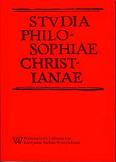„Doświadczenie niedoświadczalnego” w filozofii liturgii Jean-Yves Lacoste’a
Experience of the non-experienceable in the philosophy of Jean-Yves Lacoste
Author(s): Maciej Bała, Joanna SkurzakSubject(s): Philosophy
Published by: Wydawnictwo Naukowe Uniwersytetu Kardynała Stefana Wyszyńskiego w Warszawie
Keywords: phenomenology; religious experience; phenomenon of liturgy; space of liturgy; God; religious awareness
Summary/Abstract: The notion of religious experience gains its stable place in philosophy as late as in the 19th century. This notion is so broad that it is sometimes difficult to define it in a precise way. This article is devoted to Y. Lacoste’s conception. He is a French philosopher, for whom the notion of religious experience is based on the phenomenon of liturgy. Lacoste proposes a philosophical sense of liturgy, different from the theological one, and a characteristic understanding of the place of liturgy in philosophy. The article reports the conception of experiencing the non-experienceable, to which the phenomenon of liturgy ultimately leads. As a result, Lacoste should be classified as one of the thinkers who draw on the apophatic tradition, i.e. the tradition of acknowledging the limitations of the human mind in knowing and talking about God. The article shows that Lacoste’s method presupposes an existential and personal attitude of man in knowing the reality of God; this method also excludes the possibility of knowing this reality in a purely intellectual and abstract way; and in defining God’s nature it uses antinomy and paradox.
Journal: Studia Philosophiae Christianae
- Issue Year: 47/2011
- Issue No: 2
- Page Range: 31-62
- Page Count: 32
- Language: Polish

